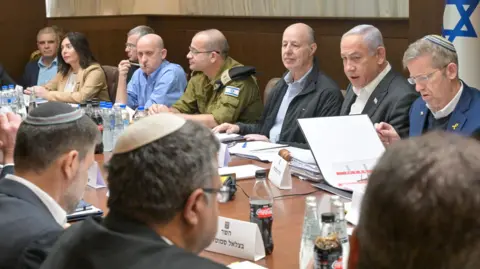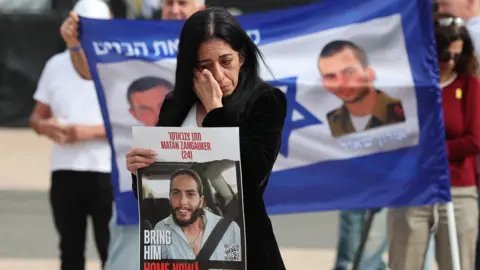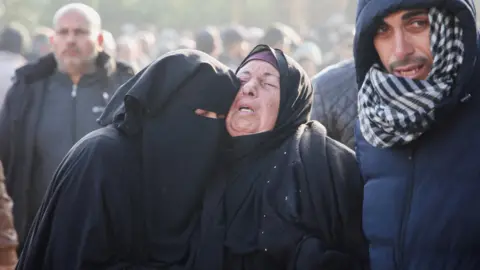The Israeli cabinet approved the Gaza ceasefire and ceasefire agreement
 Israel Government Press Office
Israel Government Press OfficeThe Israeli government has approved a new Gaza ceasefire and hostage release deal with Hamas, paving the way for it to come into effect on Sunday.
The decision came after hours of deliberation that continued late into the night. Two far-right ministers opposed the deal.
According to Prime Minister Benjamin Netanyahu’s office, the Security Cabinet had previously recommended approval of the deal, saying it “supports the achievement of the war’s objectives.”
The announcement came hours after the Prime Minister’s Office and Hamas finalized the details of the deal, two days after it was announced by Qatari, American and Egyptian mediators.
Under the deal, 33 Israeli hostages held by Hamas in Gaza after 15 months of conflict will be exchanged for hundreds of Palestinian prisoners in Israeli jails within six weeks.
Israeli forces will also withdraw from heavily populated areas of Gaza, displaced Palestinians will be allowed to return to their homes, and hundreds of aid trucks will be allowed to enter the territory every day.
The second phase of negotiations – for the release of the remaining hostages, the complete withdrawal of the Israeli army and the “restoration of lasting stability” – will begin on the 16th.
The third and final phase involves rebuilding Gaza – something that could take years – and the return of the remaining hostages.
Qatar said the hostages to be released in the first phase will include “civilian women, female soldiers, children, the elderly, sick and wounded civilians.”
Israel said three hostages were expected to be released on the first day of the ceasefire, while smaller groups were expected to be released periodically over the next six weeks.
On October 7, 2023, an unprecedented cross-border attack killed nearly 1,200 people and took 251 hostages, launching the Israeli military’s campaign to eliminate Hamas, which Israel, the United States and others have designated as a terrorist organization. .
More than 46,870 people have been killed in Gaza since then, according to the territory’s Hamas-run health ministry. 2.3 million people have been displaced, most of them have been displaced from their villages, there is massive destruction, and in the fight to help the needy, there is a huge shortage of food, fuel, medicine and shelter.
Israel said that 94 of the hostages are still being held by Hamas, and 34 of them are said to be dead. In addition, four Israelis were kidnapped before the war, two of whom died.
 EPA
EPABefore the Israeli government voted on the deal, Culture Minister Miki Zohar of Netanyahu’s Likud party said, “It is a very difficult decision, but we have decided to support it because it is very important for us to return all our children, men and women, home.”
“We hope that we will be able to finish the work in Gaza in the future,” he said.
But far-right National Security Minister Itamar Ben-Givir called the deal’s details “horrifying” and urged other ministers to vote along, including the release of “terrorists sentenced to life” in exchange for hostages. upon him.
On Thursday, Ben-Gvir announced that his Jewish Power party would withdraw from the governing coalition if the deal is accepted. But he said he would not topple the government in parliament and would return “if the war against Hamas continues with full force.”
Finance Minister Bezalel Smotrich, another far-right politician who opposed the deal, said he would leave his religious Zionist party if the war did not continue after the end of the first phase.
The three-story structure has also caused division and anxiety among some of the hostages’ families. They fear that their relatives will be left behind in Gaza after the completion of the first phase and are asking the government to ensure that the second and third phases are implemented.
“For 469 days our loved ones have been exiled, and now, finally, there is hope,” said Einav Zangauker, whose 25-year-old son Matan was taken from Kibbutz Nir Oz.
“This agreement must be followed until the end to bring everyone home and stop the war. It is in Israel’s interest to stop the war, bring everyone back and return to normalcy.”
 Reuters
ReutersA government vote was expected on Thursday, but the meeting was delayed after Netanyahu accused Hamas of reneging on parts of the deal – a charge Hamas denies.
Early on Friday, the Prime Minister’s Office announced that the Israeli negotiating team in Doha had concluded the agreement.
Hamas issued a statement saying that “obstacles” to the terms of the deal had been resolved by dawn.
A source close to Hamas told Agence France-Presse that the first three hostages to be released were women.
On Friday, Israel’s Justice Ministry published a list of 95 Palestinian prisoners it said would be part of the first group to be released in exchange for hostages. They included 69 women, 16 men and 10 minors, AFP reported.
 Reuters
ReutersA meeting was held in Cairo on Friday to discuss ways to implement the agreement, a senior Egyptian official told the BBC.
All necessary arrangements have been agreed, including the establishment of a joint operations unit comprising representatives from Egypt, Qatar, the US, Palestine and Israel, the official said.
The Egyptian-run Al-Qaira News TV quoted the source as saying that they agreed to facilitate the entry of 600 aid vehicles a day during the ceasefire.
This would require a more than 14-fold increase from the daily average of 43 trucks reported by the UN in January. But Rick Peppercorn, the WHO’s Gaza representative, said if the Rafah crossing and other crossings with Egypt were to open, “it’s too much.”
WHO plans to deliver several prefabricated hospitals to support the affected health care sector. Half of Gaza’s 36 hospitals are non-functional, while the rest are partially functional.
After the ceasefire was announced on Wednesday night, there was no peace for the Palestinians in the Gaza Strip.
A total of 117 Palestinians, including 32 women and 30 children, were killed in an Israeli attack by Gaza’s Hamas-run Civil Defense Agency.
Tamer Abu Shaban said his young niece was killed by a missile attack while she was playing in a schoolyard in Gaza City where her displaced family had taken refuge.
“Is this the reconciliation they’re talking about?” He told Reuters news agency while standing near the mortuary where the body was found. “What did this young girl do?
The Israeli military said on Thursday afternoon that it had struck 50 “terrorist targets” in Gaza in the previous day and had taken measures to prevent civilian casualties.


